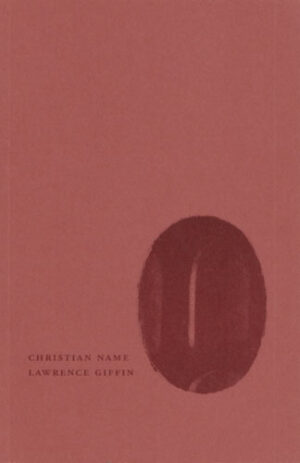In Their Own Words
Lawrence Giffin's “We Laid It Down. We Got Tired.”
We Laid It Down. We Got Tired.
Not more or less deprived
of ground regardlessly given
by a syphilitic's tube of concealer,
I still have my likes, my dislikes,
caryatids of fecal columns
grown thin and winded
with righteous authority,
that is, by my need for speech. You see,
I too am pressed by a meeker plume,
piqued by interim and hyphenated,
filched thin by great and little
domesday. I too am sideswiped
by hindsight's blind spot, sickened
by the taint below Love Canal,
by pained and rowdy defenestrators—
and yet, still dying to be
squarely set within inevitability.
Because we flavored this drunken
tizzy with hinged anticipation,
the rest of it gnaws my no. 2
as parous pulp passes into verdure
influence. A child's hide tanned a tawny mess,
popping out that polished penny
dangling before you on a shoestring
to keep your ass on the line. Brackish wards
washed by flood of new year's shakejunt
beheading, penning itself
in oar-distorted crag's reflexion,
during school-time. Too much
time and else on our hands,
nights not indexed by lines of tread
and tracer fire, too much read into to tell
and like in dreams forced to watch,
to plot the protein shake
in boring parenthetical the breadth
of a troglodyte's selfish trill.
Not just to our word is clapped
the damaged kindness that I held
slack enough to cover my ass,
but also to you, my punitive stipple,
because your waste is small
and your curves picket
my self-abuse of history.
Because you fabled your broach
with bleary lips, because
I had been drinking, because
a protein loosened diagonal
to as many synapses
as bored my stoned sport.
I was beset, besotted
in a land without scapegoat,
in a family plot plopped
with the feral coinage unslotted.
Shame is the one sign of our correct practice.
They speak of it incessantly, now
that it is no longer obvious.
True love lies in eternal ad hoc,
in pierced troth, in fuck all.
Humiliated by some catholic
humanitas, repulsed by some
protestant Naturalismus—
we laid it down, we got tired,
having still to be within range
of necessity, kept restless in a timeliness
suspended in nixing imagination.
Even secured in that propaganda,
the future, indistinguishable
from extortion, that first philosophy,
which makes stuff mine at all and is
clotted by its jot, is copied word
for word onto itself in correction fluid.
From Christian Name (Ugly Duckling Presse, 2012). All rights reserved. Reprinted with the permission of the author.
On "We Laid It Down. We Got Tired."
"We Laid It Down. We Got Tired." was my attempt to be Rodeferian. Written long hand in a Xanax-and-alcohol stupor on a plane that seemed to be slowly crashing toward Memphis.
Allusions to chemical waste spills (related to me by R. Toscano and J. Kaplan), toilet humor, the effect of casein protein on dreams, a reference to South Park. The title is taken from some of the last words of Jim Jones.
Last stanza is kind of a cynical wish for a religious experience. Transcendence as a guilty pleasure. Universal death preferable to a barred paradise. Why should anyone else get to be happy?
More recently, in Denver, after reading, a woman at N. Gordon's told me I have "too much stuff" in my poems. Later left me a beat-up copy of Four Lectures. Regrets she'd bought it. Glad to pawn it off. Appreciated, regardless.
Rodeferian? I guess because it's a love poem—but mostly just for its apish syntactic convolution and semantic gratuitousness. Epigonic. My "On a Stupendous Leg of Granite, Discovered Standing by Itself in the Deserts of Egypt, with the Inscription Inserted Below" to his "Ozymandias."
"Too much stuff," like I didn't know that already, as if the succession of yet-other things isn't a calculated series of detours deferring some ultimate decision, even if, or as if, that decision is ultimately mine. Rube Goldberg suicide machine.
Even now I can't leave the poem alone—the version above is ever-so-slightly revised from the one in the book. Once a cutter, always a cutter. Exhaustion, abandonment. Got tired, laid it down.
The decision to love or to be loved. Equally the decision to abandon the work of love. A frustrated cupido dissolvi. It's an absurd solution, but it's the path the suture takes, so that everything can be exactly as it was before minus the desire for anything different.
But really it's just a cute love poem with some poop jokes and an ironically condescending tone. The tears of a clown.



